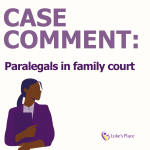Case Comment: Paralegals in family court
The mother, in this case, applied for leave to have a licensed paralegal act as her agent in a family law proceeding that involved parenting issues and family violence. While Justice Sah makes it clear that she has no concerns about the skills or integrity of the paralegal, she denies the mother’s motion.
In December 2022, the Law Society of Ontario (LSO), which governs both lawyers and paralegals, approved a proposal to allow paralegals with appropriate training to provide some family law services. To become licensed as a Family Legal Services Provider (FLSP), already registered and insured paralegals must complete a four-month online program at Fanshawe College and a 40-hour in-person placement. At this point, they can seek LSO authorization to provide legal services as a FLSP.
When this case was heard, there were no FLSPs, as the first training program had not yet begun. The first graduates became eligible to be registered as FLSPs in May 2025.
Justice Sah, then, had to consider Rule 4(1)(c) of the Family Law Rules which allows a party to be represented by a person who is not a lawyer only if the court gives permission in advance. She noted that:
- The rule is discretionary and each request must be considered on its own merits
- It needs to be interpreted in a manner that is consistent with existing legislation
- It should be interpreted narrowly
- There should be special circumstances for such a request to be granted
She then reviewed the scope of activities for FLSPs as now set out by the LSO:
- Assisting clients navigate family court process
- Completing applications for joint and uncontested divorces
- Preparing and arguing motions to change child support in certain circumstances
- Responding to support enforcement proceedings
- Filing domestic contracts
- Preparing change of name applications
As she wrote in her decision:
“[F]uture FLSPs have a very limited scope of practice in family matters. The current and future scope of practice was undoubtedly given careful consideration by the LSO and the nature of paralegals’ current and future practices was intentionally restricted. To me, this signals that the court must cautiously approach requests from paralegals, to ensure leave is not automatically granted permitting them to represent litigants in areas which they have been expressly restricted practice by their governing body.”
Justice Sah had this to say about paralegals/FLSPs acting in cases involving family violence:
“[P]aralegals are not permitted by the LSO to act in cases involving parenting and in particular family violence, not now nor once the FLSPs program is in place.”
You may find yourself assisting a woman who believes she can hire a FLSP to act on her behalf in family court because she is not aware of how restricted the scope of practice for FLSPs is. This case is a good guideline for all of us to follow.

